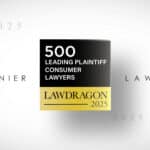Film includes trial lawyer Mark Lanier who won $4.69B verdict for cancer victims
HOUSTON – A New York Times documentary exposes Johnson & Johnson’s extensive internal records about the link between talcum powder and cancer-causing asbestos and features an interview with prominent trial lawyer Mark Lanier whose own team revealed much of that documentation in winning a $4.69 billion verdict for cancer victims.

Researched by New York Times reporters Roni Caryn Rabin and Tiffany Hsu, the documentary explores how personnel within Johnson & Johnson – maker of iconic Johnson’s Baby Powder and Shower to Shower – were aware of asbestos contamination in the powder for decades but failed to disclose that to consumers.
The extensively researched segment is featured in the first season of the documentary series “The Weekly.” It explores the plight of women who developed ovarian cancer after using the talc-based products. More than 15,000 plaintiffs who have claimed in court filings that Johnson & Johnson’s talc products caused their cancer.
Mr. Lanier, founder of The Lanier Law Firm, won the $4.69 billion jury verdict in 2018 on behalf of 22 ovarian cancer victims and their families. In the interview, he describes how internal company documents dating back four decades show that the company knew about asbestos contamination. The cosmetics industry is self-regulated and the government requires no testing of cosmetic consumer products before they are marketed.
“The last thing in the world that Johnson & Johnson is going to do is say, ‘Geez, you’re right. Our flagship product that engenders trust in so many people, the product that has gone in hundreds of millions of peoples’ lungs in America has asbestos in it. And oh, by the way, did we tell you we’ve known that for decades and ignored it?’” Mr. Lanier said.
Among other things, the documentary crew traveled to Israel to interview a scientist hired by Johnson & Johnson in the 1970s to analyze talc samples. Aviam Elkies said that after his tests revealed traces of asbestos, funding for his work stopped, and his findings were not reported.








